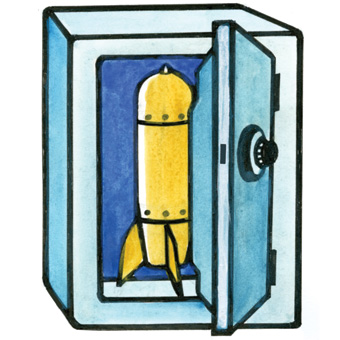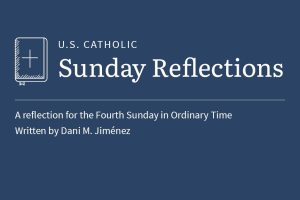President Obama wants to lock up nukes—but he isn’t about to throw away the key.
The 2008 election of Barack Obama was arguably a culmination of the hope-filled idealism that helped propel the 1960s civil rights movement. Although it’s fashionable these days, in the last gasps of the frat-boy revivalism that began the century to ridicule such idealism, the truth is we wouldn’t have made it to the Obama era’s here-and-now without that there-and-then.
Now the president is engaged in another crusade that unconsciously nods to the ’60s. His recent negotiations with Russia and cattle call of nuclear powers at the Washington nuclear weapons summit in April recall the efforts of previous dreamers who imagined peace—or at least a piece of the future liberated from the threat of nuclear annihilation.
But Obama is no ’60s retread in post-boomer clothing. His style of disciplined policy-making leaves little room for dreaming out loud. His preferential option is a world with fewer nuclear weapons, knowing that it may take generations to completely rid the world of the threat of nuclear ruin or the unspeakable devastation of even a single nuclear strike.
The nuclear issue allows Obama to again make common cause with U.S. bishops, a likely relief to both after the recent unpleasantness over health care reform. The bishops seem enlivened by Obama’s interest in reducing the world’s nuclear stockpile. Recent statements have reiterated the church’s call for nuclear disarmament, and statements from both the U.S. bishops and the Vatican now essentially reject the notion that nuclear weapons can ever be deployed in keeping with just-war proscriptions.
In a speech at Georgetown University in March, Archbishop Celestino Migliore, the Vatican’s representative to the United Nations, said, “The conditions that prevailed during the Cold War, which gave a basis for the church’s limited toleration of nuclear deterrence, no longer apply in a consistent and effective manner.”
Speaking in February at the Global Zero Summit in Paris, Archbishop of Baltimore Edwin O’Brien reiterated the Catholic Church’s condemnation of “total war” in a call for courage and for common sense as we seek to construct a practical, forward-leaning ethic of disarmament.
“A world with zero nuclear weapons will need robust measures to monitor, enforce, and verify compliance,” he said. “The path to zero will be long and treacherous. But humanity must walk this path with both care and courage in order to build a future free of the nuclear threat.”
Now U.S. bishops are loudly urging members of the U.S. Senate to come together across party lines to ratify the New Strategic Arms Reduction Treaty (START), and they’ve welcomed the administration’s revisions of the U.S. nuclear posture as a “significant, yet modest, shift toward a world free of nuclear weapons.”
The diplomatically strategic Obama has tinkered with the nation’s defense policy on nukes, moving it a half-step closer to a firm commitment to not use nuclear weapons as a first-strike option. That has disappointed some supporters, but Obama shows an astute grasp of the hard political possibles by merely revising, rather than rewriting, the official U.S. position on nuclear weapons.
U.S. conservatives, predictably, accuse the president of endangering national security with his attempts to restart nuclear disarmament and reposition the the country on nuclear weapons use, but in truth there is not all that much new to get too excited about.
Obama is moving along the moderate path toward stockpile reduction followed by U.S. presidents for decades. Arms reduction was a campaign pledge, and he is slowly working through his campaign checklist. This long farewell to nuclear arms has, in fact, been pursued with vigor in the past by such conservative heartthrobs as Ronald Reagan.
The global nuclear summit was more evidence of that methodical style toward audacious goals. Obama is not looking for radical shifts that will likely prove politically untenable or geopolitically unsustainable. He’s hoping to merely adjust the geopolitical course toward the goal of global nuclear materials containment and disarmament, recognizing that as it took decades to reach our current minute on the doomsday clock, it will take decades to wind down toward a sustainable non-nuclear status quo that all players, whether compelled or persuaded to accept, can trust.
This article appeared in the July 2010 issue of U.S. Catholic (Vol. 75, No. 7, page 39).
Image: Tom Wright














Add comment